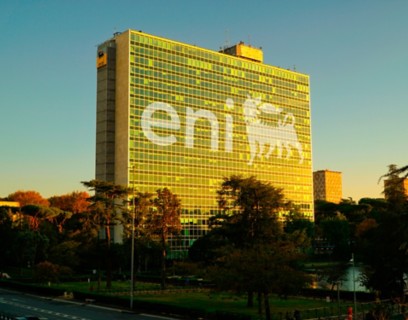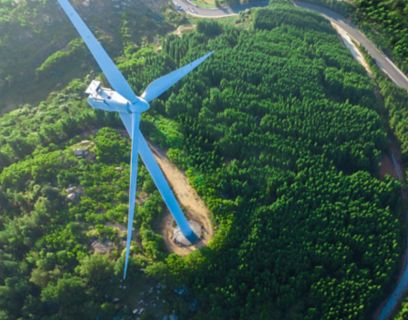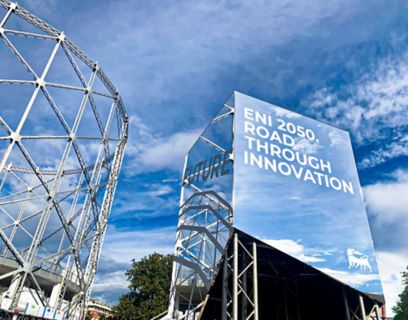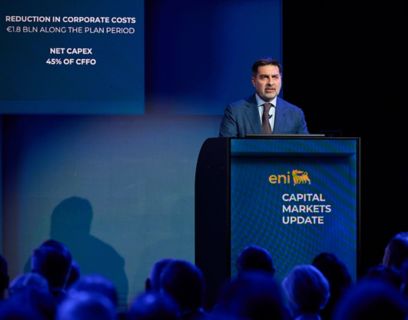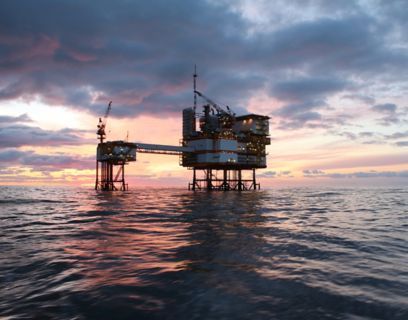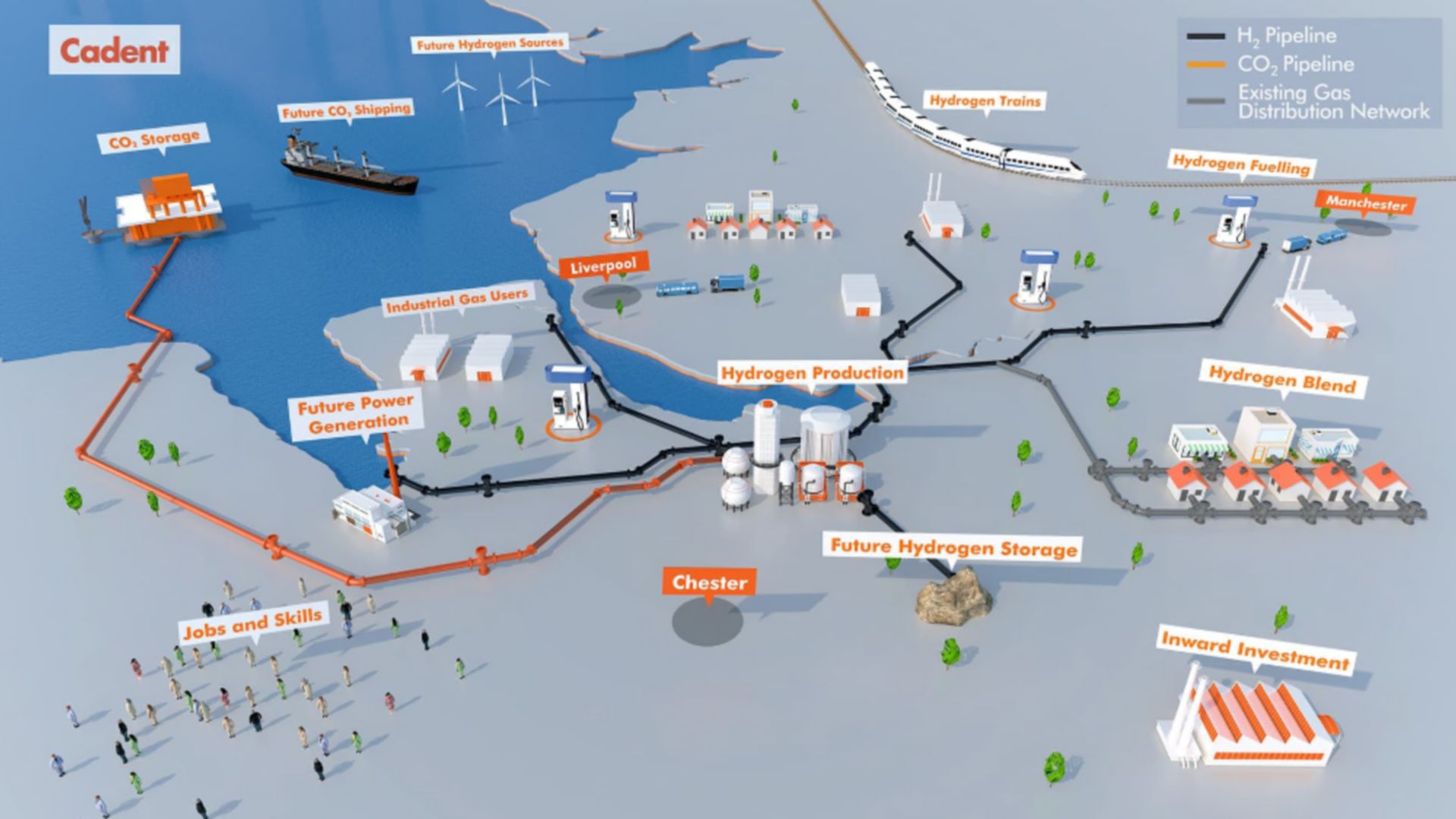- STORIES
MyEni Login

Our world is changing. Global warming is not only altering nature but also the way people live. In this context, Eni adopted last year its 2050 net zero strategy, aimed both at satisfying the world's growing energy needs while also avoiding greenhouse gas emissions into the atmosphere.
As the company transitions to net zero, Eni is changing its energy mix, increasing its offering of carbon neutral products and building up its portfolio of renewable energy solutions.
In the UK, Eni UK's main energy transition businesses are focused on wind power, and carbon capture, utilization and storage, also known as CCUS. Helping speed the transition to net zero, CCUS technology helps existing industry effectively tackle CO2 emissions — in particular for “hard to abate" sectors. Instead of CO2 being released into the atmosphere where it can contribute to global warming, it is captured, transported, and permanently stored far underground. The International Energy Agency has said that the capture, utilization and storage of CO2 must be a pillar of the efforts to eliminate net greenhouse gas emissions within this century.
Seeing this opportunity, Eni became the cluster leader for HyNet North West, which is helping to capture and store carbon from North West of England and North Wales, one of the UK's most important industrial regions, as well as one of its most energy-intensive industrial districts.
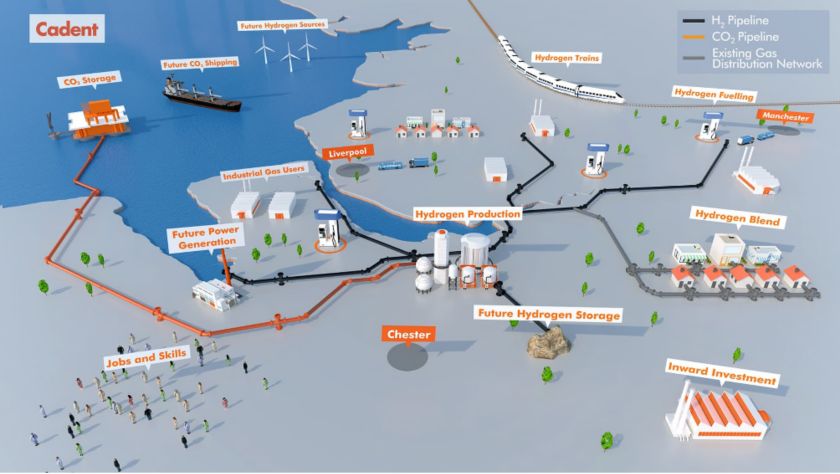
The Hynet North West Project
“Our ambition is to be the first CCUS in the UK as early as 2025. It will be part of our efforts to help the UK reduce emissions in the region decarbonising the industrial sector and paving the way for the transition to the hydrogen economy," are the statements of Nicolò Aggogeri, during his time in charge as Managing Director in Eni UK. “We have been appointed a Track 1 Cluster by the Government, meaning we can begin our operations in a rapid timeframe. This decision also shows the priority the Government places on the UK being a world-leader in decarbonisation."
Through the HyNet North West project, Eni will also meet its goals for a socially fair energy transition. For the region, HyNet North West will do more than help decarbonise industry. Besides, creating around 6,000 jobs annually for the next 10 years, it will also help protect jobs in industries that would otherwise be threatened because of the UK's net zero commitments, protecting around 350,000 jobs.
“There are heavy energy-use sectors for which it will be a problem to operate as is when the UK's net zero commitments come into play, including cement manufacturing, steelwork, power generation, and fertilizers producers. CCUS will help them continue to operate. By protecting jobs as well as adding new jobs to the region, we are helping the North West maintain its status as an industrial leader in the UK," says Aggogeri.
Giving new life to old infrastructure
Eni recognised the potential to turn a depleted gas field into something that could not only benefit the region but also further both the UK and Eni's net zero ambitions by taking carbon out of the atmosphere.
HyNet North West will use the existing pipelines to transport CO2 from industry around the region. The CO2 will then be stored in its depleted hydrocarbon reservoirs, located around 20 miles offshore in Liverpool Bay, for which the company was awarded a carbon storage license by the UK Oil & Gas Authority in October 2020.
The project will help reduce CO2 emissions by up to 10 million tonnes a year by 2030 — that's the equivalent of taking 4 million cars off the road — and will also improve the local air quality.
“We saw that we could give new life to our existing infrastructure, maximizing the value of our asset with a circular economy approach. We are able to reuse our facilities to contribute to our net zero goals," continues Aggogeri.
“Instead of bringing gas from offshore to onshore, we are bringing CO2 from onshore to offshore. The carbon that arrived with the methane molecule is sent back to the reservoir from where it originated through the CO2 molecule. Building a new network would take many years and be complicated in terms of the permits needed. Eni took the opportunity to have such an asset so close to the market demand for decarbonisation, with excellent cost and deliverability benefits for repurposing versus a new-built facility for CO2 storage."
The only new construction required will be a 20-mile (33 km) pipeline from the Stanlow Industrial Complex to the tie-in with our existing pipeline which will allow it to link up with the existing pipelines. Although this section is relatively small, it crosses the properties of 190 landowners. As part of the beginning of the project, Eni will need permission to take environmental samples.
“We have been extremely well impressed that we have already obtained consent over the 95 percent of the route by landowners who have already said yes to our proposed sampling work. A process we had thought would be a challenge was anything but, and it illustrated how much HyNet North West is a demanded and desired project in the region and how the local community understands what a wonderful opportunity is for the decarbonisation of the region," continues Aggogeri.
A new source of energy
In addition to the CCUS project, HyNet North West will also create the UK's first hydrogen network to produce, store and distribute hydrogen, an alternative fuel for heating, generating electricity and transport. This will help further decarbonise the North West of England and North Wales. By 2030, HyNet could deliver 80% of the Government's new UK-wide target of 5GW of low carbon hydrogen.
To help deliver the HyNet's ambitious CCUS and hydrogen projects, the Hynet consortium has built partnerships with 40 companies in the region, some of those will be the emitters of CO2 for the CCUS system, some will be involved in the production of low carbon hydrogen and some are the future consumers of the low carbon hydrogen.
While the HyNet North West project is unique in many ways, Eni has been able to leverage its experience with other CCUS and hydrogen projects. Eni is already one of the largest producers and consumers of hydrogen in Italy, and in Ravenna, the company is planning a similar CO2 hub that will eventually have a capacity of up to 500 million tonnes. It will help reduce emissions in some of the most difficult-to-decarbonise sectors, including iron, steel, cement and chemicals.
Moving quickly toward CCUS
HyNet North West is being developed with the Fast Track approach that characterizes Eni project development. With the nomination of Hynet as Track 1 cluster, we are now targeting the Final Investment Decision for the project in 2023. HyNet North West is scheduled to start operating in 2025. The CCUS will have in the first phase a capacity of 4.5 million tonnes per year and will ramp up quickly to 10 million tonnes after 2030. Altogether, the CO2 saving delivered by HyNet North West in 2030 will be equivalent to the emissions from heating over 5 million households with natural gas boilers for a year.
“HyNet is a story of magic. The whole project has been born in just one year, practically unheard of for a development of this magnitude. Our team has understood that it's special and a real opportunity and they have worked round the clock to make it what it is today. Passion, commitment and a desire to deliver by our company has helped turn this dream into a reality" - ends Aggogeri.
The author: Rachel Elbaum Stafler
A London-based freelance journalist who covers renewable energy and sustainability.
Eni.com is a digitally designed platform that offers an immediate overview of Eni's activities. It addresses everyone, recounting in a transparent and accessible way the values, commitment and perspectives of a global technology company for the energy transition.
Discover our mission



